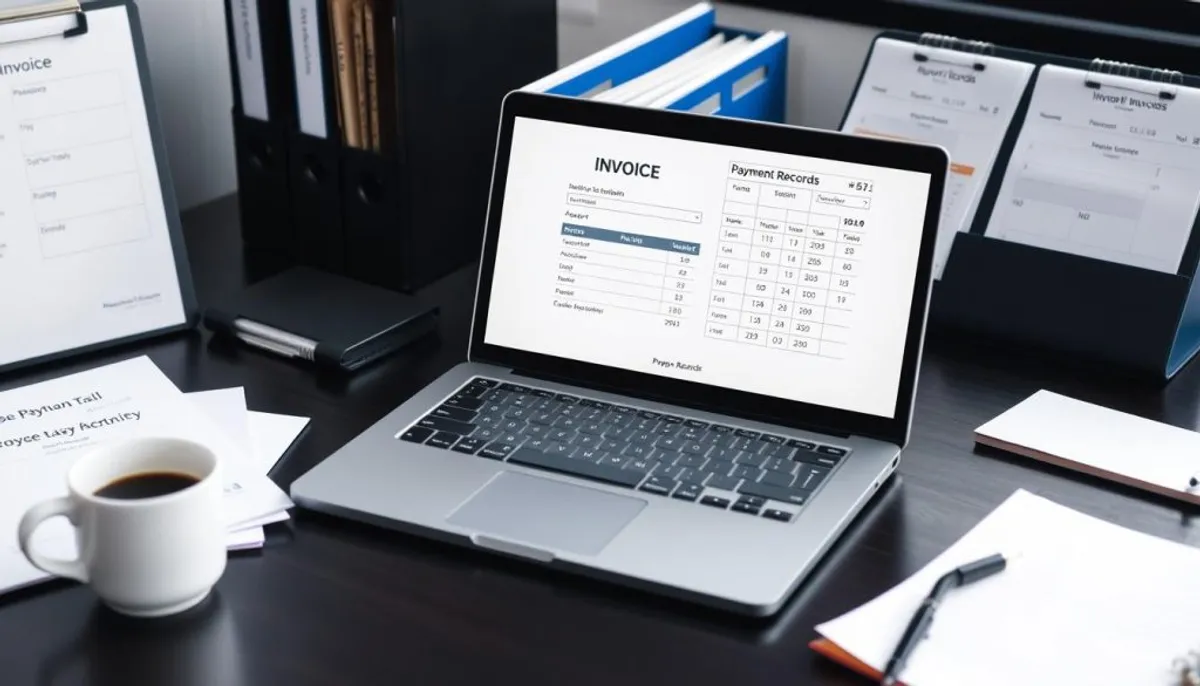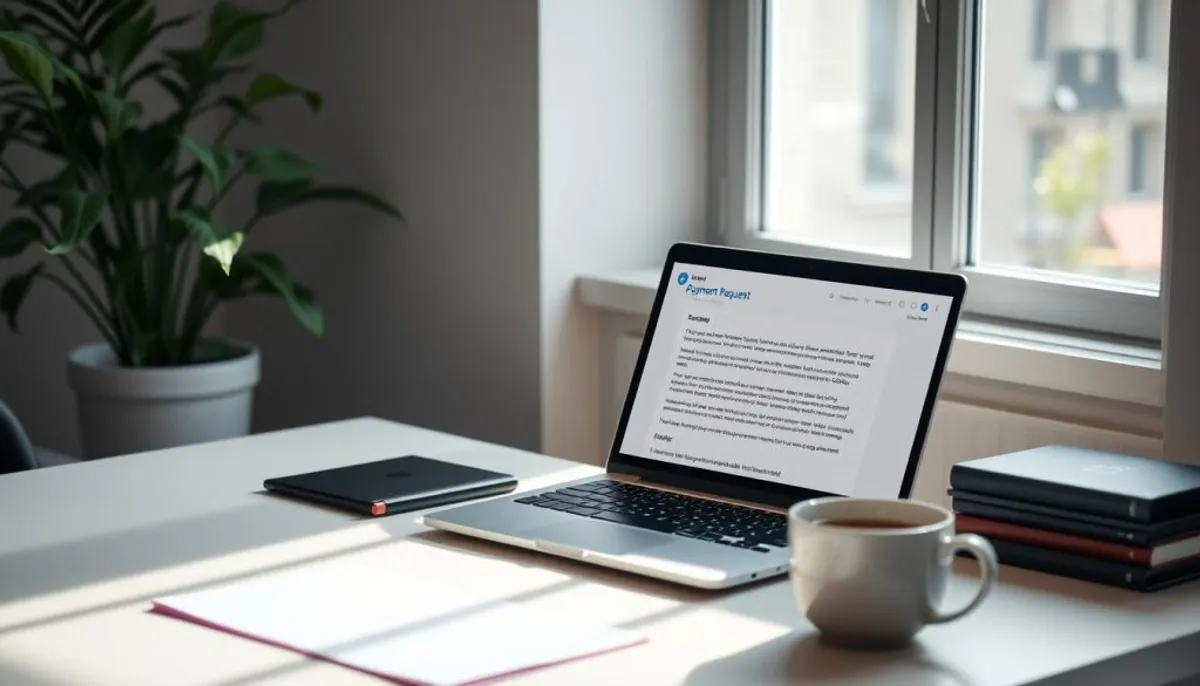In the fast-paced realm of business, unpaid invoices can swiftly become a major hindrance. A 2022 study uncovered that 49% of invoices in the US face delays, underscoring a substantial challenge for numerous enterprises. Ensuring clear communication with clients regarding unpaid invoices is imperative for preserving robust cash flow and fostering enduring business relationships.

Overdue payment reminders are pivotal in effective invoice collection strategies. By establishing systematic follow-up protocols, businesses can notably enhance their prospects of receiving payments in a timely manner. It transcends mere reminders; it encompasses cultivating transparent communication channels to resolve any hindrances to prompt payments.
Poor communication frequently underpins payment delays. Ambiguous terms, erroneous billing details, or misinterpretations regarding products or services can precipitate unpaid invoices. By emphasizing clear, consistent communication, you can mitigate these problems and sustain a steady cash flow.
Key Takeaways
- 49% of US invoices become overdue, emphasizing the need for effective communication
- Clear payment terms reduce misunderstandings and delays
- Systematic follow-up processes improve invoice collection
- Prompt invoicing is essential for timely payments
- Open communication helps address issues causing payment delays
- Overdue payment reminders are crucial for maintaining cash flow
Understanding the Impact of Unpaid Invoices on Your Business
Unpaid invoices can severely disrupt your business operations. A 2022 study showed that 49% of invoices issued by US businesses become overdue. This widespread issue affects various aspects of your company.
Cash Flow Disruption
Late payments significantly impact your cash flow. With approximately $300,000 owed in late payments, businesses face challenges in covering operational costs. This can lead to difficulties in managing bills and expenses, potentially jeopardizing your financial stability.
Increased Financial Risk
Unpaid invoices increase financial risks for your business. High levels of unpaid invoices can negatively affect your credit standing, limiting your ability to invest in growth. This uncertainty complicates budgeting and financial planning, making it challenging to make informed decisions about your company’s future.
Operational Challenges
Chasing unpaid invoices diverts valuable resources from essential business activities. A survey found that 65% of businesses spend 14 hours per week on administrative tasks related to collecting payments. This time could be better spent on improving Client Relationship Management or refining Accounts Receivable Processes.
To mitigate these issues, consider implementing effective Debt Recovery Techniques. Utilize invoicing software to streamline payment management processes, send prompt reminders, and offer flexible payment options. By addressing unpaid invoices proactively, you can safeguard your business’s financial health and focus on growth.
Common Causes of Unpaid Invoices
Understanding the root causes of unpaid invoices is crucial for effective billing dispute resolution. Professional communication skills play a key role in addressing these issues. Let’s explore the common reasons behind delayed payments.
Cash flow problems top the list of reasons for unpaid invoices. A staggering 82% of failed businesses cite cash flow issues as a major factor in their downfall. Clients facing financial difficulties often prioritize other expenses, leading to delayed payments.
Disputes over services or products can also result in non-payment. Miscommunication or differing expectations between buyer and seller can cause tension. Clear communication and detailed contracts are essential to avoid such misunderstandings.
- Incorrect invoicing or documentation
- Payment processing errors
- Client disorganization or oversight
- Changes in client leadership
Inadequate follow-up and reminder systems contribute to late payments. Establishing an automated reminder process can significantly improve invoice recovery rates. Sending reminders before, on, and after the due date helps maintain timely payments.
| Cause | Impact | Solution |
|---|---|---|
| Cash flow problems | Delayed payments | Flexible payment terms |
| Service disputes | Non-payment | Clear communication |
| Inadequate follow-up | Overlooked invoices | Automated reminders |
By addressing these common causes and employing professional communication skills, businesses can improve their billing dispute resolution processes and reduce the occurrence of unpaid invoices.
Communication with Clients about Unpaid Invoices
Effective communication is paramount when addressing unpaid invoices. In the US, businesses often spend 14 hours weekly on late payment follow-ups. To circumvent this, it’s essential to clearly outline payment terms and maintain consistent follow-up efforts.

Establishing Clear Payment Terms
It’s vital to set transparent payment terms from the outset. Specify due dates, accepted payment methods, and any applicable late fees. Such clarity minimizes misunderstandings and encourages timely payments.
Consistent Follow-Up Strategies
Adopt a systematic approach for tracking overdue invoices. Businesses that diligently follow up on 90% or more of their invoices tend to see payments within a week of the due date. Send gentle reminders a day or two post-due date to catch any oversights.
Utilizing Multiple Communication Channels
Employ a variety of communication channels to ensure your message is conveyed. Utilize email, phone calls, and postal mail for critical notifications. This strategy enhances the likelihood of maintaining a positive rapport with clients while tactfully requesting payments.
The objective is to recover payments while safeguarding client relationships. Offer flexible solutions like payment extensions or structured repayment plans when needed. By striking a balance between professionalism and empathy, you can adeptly manage unpaid invoices without jeopardizing crucial business connections.
Effective Strategies for Invoice Management
Mastering invoice collection strategies and streamlining accounts receivable processes are crucial for business success. Small and medium-sized businesses in the US spend about 15 days yearly chasing late payments. To tackle this issue, let’s explore effective invoice management techniques.
Prompt invoicing is key. Send invoices immediately after delivering goods or services. Clear payment terms help avoid confusion. Offer flexible payment options to accommodate client preferences. Implement a collection policy with defined procedures to ensure consistency.
Technology plays a vital role in invoice management. Use accounting software to automate invoicing and payment tracking. This reduces errors and saves time. Consider offering early payment discounts or charging late fees to incentivize timely payments.
- Send invoices promptly
- Establish clear payment terms
- Offer flexible payment options
- Implement a collection policy
- Use technology for automation
- Consider incentives and penalties
Regularly review and update your invoicing processes. This helps improve efficiency and reduce errors. By implementing these strategies, businesses can significantly reduce the 49% of invoices that become overdue in the United States.
| Strategy | Benefit |
|---|---|
| Prompt Invoicing | Faster Payment Receipt |
| Clear Terms | Reduced Disputes |
| Flexible Options | Increased Client Satisfaction |
| Automation | Improved Efficiency |
Leveraging Technology for Streamlined Communication
Technology is pivotal in managing Overdue Payment Reminders and enhancing Client Relationship Management. Advanced tools streamline communication and invoice management processes. This integration is crucial for businesses aiming to optimize their operations.
Automated Reminder Systems
Automated reminder systems significantly reduce manual efforts in sending payment reminders. These systems are programmed to send timely notifications, ensuring clients are promptly informed about outstanding invoices. This automation not only saves costs but also minimizes human errors in billing.
Client Portals for Easy Access
Client portals offer a convenient platform for customers to access their invoice information and make payments. These portals enhance Client Relationship Management by providing transparency and self-service options. Customers can view their payment history, download invoices, and settle outstanding balances at their convenience.
Electronic Invoicing Solutions
Adopting electronic invoicing solutions expedites the billing process and reduces errors. These systems integrate seamlessly with accounting software, ensuring accurate financial records and streamlined reconciliation processes. Electronic invoicing also enables faster payment processing, improving cash flow for businesses.
| Technology Solution | Benefits |
|---|---|
| Automated Reminder Systems | Reduced manual effort, minimized errors, timely notifications |
| Client Portals | Improved transparency, self-service options, enhanced client satisfaction |
| Electronic Invoicing | Faster processing, reduced errors, improved cash flow |
By implementing these technological solutions, businesses can significantly improve their Overdue Payment Reminders process and strengthen Client Relationship Management. The result is a more efficient, accurate, and customer-friendly approach to invoice management.
Building Strong Client Relationships Through Communication

Effective communication is paramount in maintaining positive client rapport, notably when dealing with unpaid invoices. By honing Professional Communication Skills, businesses can fortify relationships and ensure timely payments. A study reveals that 85% of clients value clear communication regarding overdue payments.
To foster trust, adopt a friendly yet firm tone in all interactions. Display empathy towards client circumstances while upholding payment terms. Offering payment plans showcases flexibility and understanding. In fact, 75% of clients react positively to personalized follow-up actions tailored to their situation.
Regular updates on invoice status prevent miscommunication. Clients who receive friendly reminders are 70% more likely to settle invoices on time. This proactive stance not only enhances cash flow but also fortifies client relationships.
| Communication Strategy | Impact on Client Relationships | Payment Recovery |
|---|---|---|
| Clear Payment Terms | Builds Trust | 95% Resolution Rate |
| Regular Check-ins | Improves Rapport | 70% Timely Payments |
| Personalized Follow-ups | Strengthens Relationships | 75% Positive Response |
| Systematic Approach | Maintains Professionalism | 40% Faster Recovery |
Remember, maintaining positive client rapport is an ongoing endeavor. By consistently employing these Professional Communication Skills, businesses can cultivate enduring, strong relationships while adeptly managing unpaid invoices.
Legal Considerations and Escalation Procedures
Understanding the legal framework is essential when dealing with unpaid invoices. It’s vital to know when to escalate matters. Debt Recovery Techniques and Billing Dispute Resolution are crucial for managing overdue payments effectively.
When to Consider Legal Action
Legal action should be a last resort for recovering unpaid invoices. Small business owners often spend 14 hours weekly chasing payments. Before resorting to legal measures, exhaust all other avenues like personalized communications and flexible payment plans for long-standing clients.
Understanding Debt Collection Laws
It’s important to familiarize yourself with debt collection laws to ensure compliance. Late payment consequences may include fees, interest, and the involvement of collection agencies. For smaller amounts, the cost of legal action might outweigh potential recovery. Thorough documentation throughout the collection process is crucial.
Mediation and Dispute Resolution
Invoice disputes can arise from various reasons, including incorrect item listing, delayed deliveries, or quality issues. To resolve disputes, consider communication, negotiation, mediation, or arbitration before legal action. Clear contracts and transparent invoicing can prevent many disputes.
Remember, employing Billing Dispute Resolution techniques like offering multiple payment options can expedite collections. Companies seeking broader payment methods beyond checks can enhance AR efficiency and accelerate cash flow.
Preventive Measures to Reduce Unpaid Invoices
Implementing effective Invoice Collection Strategies can significantly reduce unpaid invoices and improve cash flow. A proactive approach to Client Relationship Management is key to preventing payment delays.
Credit checks on new clients help assess their financial reliability. For large projects, requiring deposits or upfront payments can mitigate risks. Clear communication of payment terms from the start sets proper expectations.
Efficient invoicing processes minimize errors and delays. Regular reviews and updates of credit policies ensure they remain effective. Offering incentives for early payments can encourage prompt settlements.
- Send reminders 1-2 days after due date
- Add late payment charges after 14 days
- Customize invoices with logos and notes
- Include essential details like dates and due amounts
- Use simple yet professional invoice designs
Implementing these strategies can lead to faster payments and stronger client relationships. Remember, outstanding invoices can strain cash flow, so efficient invoice management is crucial.
| Preventive Measure | Impact |
|---|---|
| Credit checks | Assess client reliability |
| Upfront payments | Mitigate financial risks |
| Clear communication | Set proper expectations |
| Early payment incentives | Encourage prompt settlements |
| Automated reminders | Reduce payment delays |
Conclusion
Effective management of unpaid invoices is crucial for a business’s health. Communication with clients about unpaid invoices is essential for swift resolution. Studies reveal that 64% of companies face late payments, with 23% unable to hire due to cash flow issues.
Strategies like offering early payment discounts and using credit card payments can reduce unpaid invoices. Consistent overdue payment reminders significantly boost collection rates. A personal phone call is often more effective than written communication in prompting clients to settle outstanding invoices.
Businesses should consider using collection software to optimize working capital and streamline invoice management. Clear invoicing practices, including all necessary information and payment terms, prevent misunderstandings and delays. By prioritizing effective communication and leveraging technology, businesses can mitigate the effects of unpaid invoices and foster strong client relationships.
RelatedRelated articles



